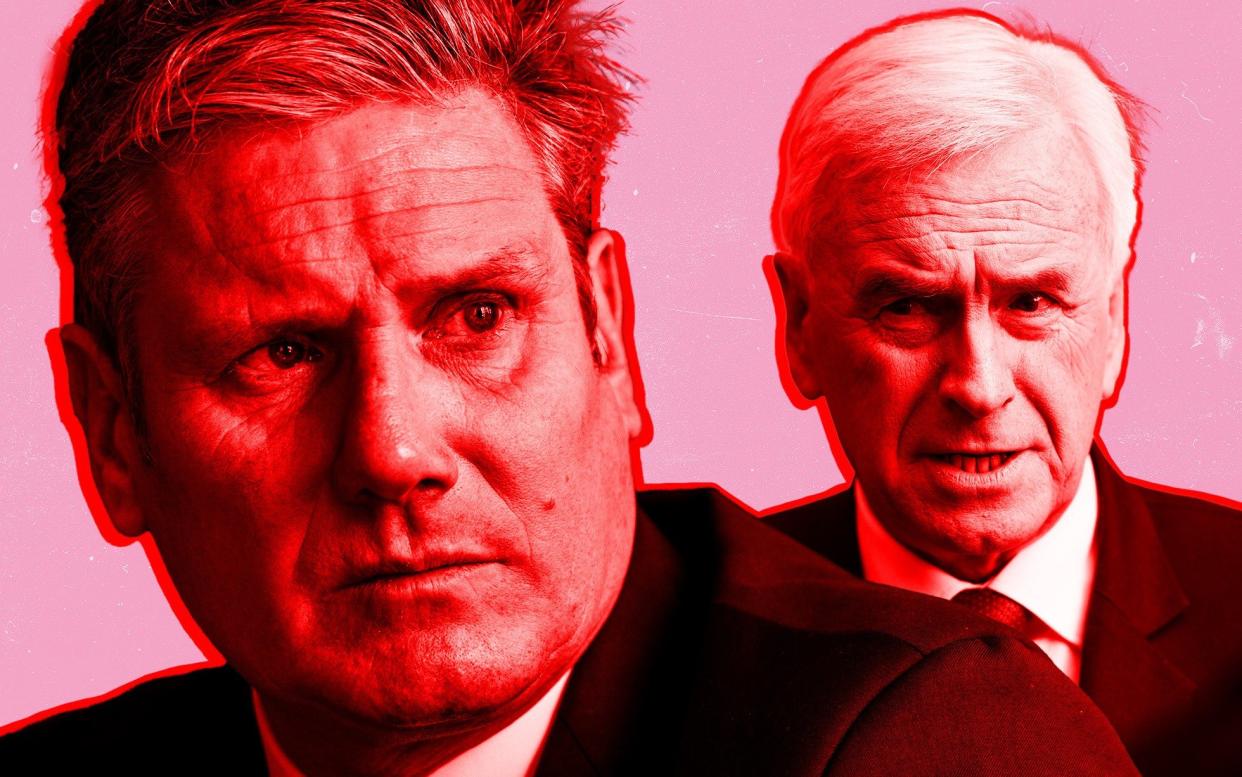Inside the Labour Left faction hoping to give PM Starmer a political headache

Sir Keir Starmer has spoken of his years leading the opposition as a “long, hard slog”, which has led to a “changed party. No longer in thrall to gesture politics, no longer a party of protest, a party of service.”
The swipe at Jeremy Corbyn and his supporters was thinly-veiled with the once-influential Left pushed to the fringes of the party under Sir Keir’s leadership.
But to what extent might the Labour Left cause a headache for Sir Keir if he becomes prime minister?
Insiders believe the grouping – certainly as it was under Mr Corbyn – is a spent force, pointing to suspensions of high-profile MPs along with the selection of scores of centrist Labour candidates to fight the next election.
The Socialist Campaign Group (SGC), which is historically the Left’s heart within the Parliamentary Labour Party, is depleted in numbers after the whip was removed from a string of members, including the seismic suspension of Mr Corbyn in March 2023.
His removal sparked fears among some other Left-wing MPs that they could suffer a similar fate, with those intent on standing for Labour at the next election left feeling they needed to keep their heads down.
Other SCG members who have been suspended from the party include Diane Abbott, Kate Osamor and Andy McDonald – though Mr McDonald had the whip reinstated this month.
Not the group it was
Sir Keir has come under pressure to re-admit Ms Abbott too in solidarity following alleged comments about the former shadow home secretary by Frank Hester, a Tory donor, that both Labour and the Tories called “racist”. But her return does not appear imminent.
Even if Ms Abbott were to return, the SCG would not be the sizeable group it once was. Sources estimate its headcount to be fewer than 20, a number significantly smaller than the overwhelming majority Sir Keir is expected to win.
What’s more, it does not look like the group will be flooded with new recruits. Figures on the Left believe candidate selection is tightly-controlled, with just one or two of those selected for Labour considered to be on that side of the party.
Some currently in the Commons are also thought to be on the brink of retirement.
With a landslide majority predicted at the general election, Sir Keir is unlikely to need the support of his Left-wing to get legislation through Parliament although he has consistently warned against complacency as polls can narrow the closer the nation comes to election day.
“All the evidence would suggest that he will do what he needs to do to govern effectively. But there is no question that a small majority makes the management of the Labour Left a much greater challenge,” one senior Labour source admitted.
Sir Keir’s domestic policy platform is far from the radical one he stood on to become Mr Corbyn’s replacement, with the party appearing to move towards the centre ground on some key issues as it has come closer to power.
Back in 2020, Sir Keir’s 10 pledges included hikes in income tax for the top 5 per cent and scrapping tuition fees – both decidedly Left-wing policies that have fallen by the wayside in favour of a more cautious fiscal agenda.

But insiders believe it is on foreign policy – described by one senior source as “Labour’s Achilles’ heel when it comes to party discipline” – where Sir Keir is most likely to become unstuck.
Recent turmoil within the party on the conflict in Israel-Gaza shows the most destabilising fissures in party unity are most likely to come from the Labour leader’s stance on geopolitical issues.
Zarah Sultana, a co-chairman of the SCG, tabled an amendment to the King’s Speech in November 2023 along with SCG members Richard Burgon and John McDonnell among others, calling on the Government to back an immediate ceasefire – a significant step beyond the party’s position at that time.
The internal conflict reached its climax when 10 of his frontbenchers resigned over a vote calling for a ceasefire tabled by the SNP the same month.
Sir Keir narrowly avoided embarrassment again in the Commons last month when a Labour amendment was selected for another SNP motion.
Ceasefire calls pressure
If the conflict in the Middle East were to continue or, indeed worsen while Sir Keir was in Downing Street, he might struggle to navigate a government response that keeps his Left-wing backbenchers on side.
But one senior Labour source said Sir Keir’s handling of the Israel-Gaza conflict showed he could face down the Left in the wake of enormous pressure. “The real takeaway of that full story is that actually Keir was willing to spend a lot of internal political capital on maintaining a position on that issue,” the source said.
They claim his “statesman-like” response to the conflict, with his stance changing in line with attitudes in the US and governments in the wider Western world, reflected a failure of backbenchers to push the party dial.
Asked in what world the Labour Left would cause the biggest headache to Sir Keir, the senior source said: “Morgan [McSweeney, his campaign manager] gets hit by a bus, we win a majority of 15, some very old, very dogmatic people on the far Left don’t retire and Iran invades Israel. That’s my scenario.”
In short, with the polls as they are and with the Labour Left brought low by party discipline and candidate selections not in their favour, they are unlikely to be in a position to wield much influence on Sir Keir.
His “long, hard slog” appears, at least for now, to have paid off.



